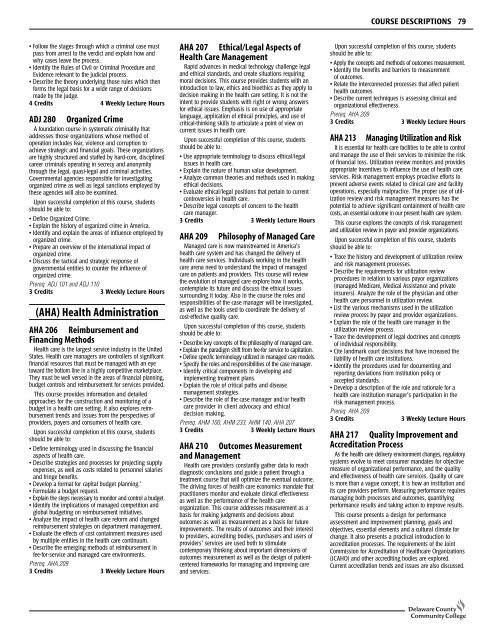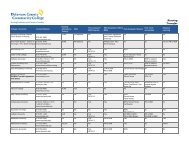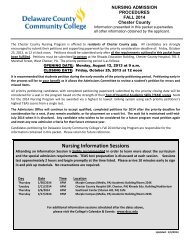2010 Catalog - Delaware County Community College
2010 Catalog - Delaware County Community College
2010 Catalog - Delaware County Community College
You also want an ePaper? Increase the reach of your titles
YUMPU automatically turns print PDFs into web optimized ePapers that Google loves.
COURSE DESCRIPTIONS 79<br />
• Follow the stages through which a criminal case must<br />
pass from arrest to the verdict and explain how and<br />
why cases leave the process.<br />
• Identify the Rules of Civil or Criminal Procedure and<br />
Evidence relevant to the judicial process.<br />
• Describe the theory underlying those rules which then<br />
forms the legal basis for a wide range of decisions<br />
made by the judge.<br />
4 Credits 4 Weekly Lecture Hours<br />
ADJ 280<br />
Organized Crime<br />
A foundation course in systematic criminality that<br />
addresses those organizations whose method of<br />
operation includes fear, violence and corruption to<br />
achieve strategic and financial goals. These organizations<br />
are highly structured and staffed by hard-core, disciplined<br />
career criminals operating in secrecy and anonymity<br />
through the legal, quasi-legal and criminal activities.<br />
Governmental agencies responsible for investigating<br />
organized crime as well as legal sanctions employed by<br />
these agencies will also be examined.<br />
Upon successful completion of this course, students<br />
should be able to:<br />
• Define Organized Crime.<br />
• Explain the history of organized crime in America.<br />
• Identify and explain the areas of influence employed by<br />
organized crime.<br />
• Prepare an overview of the international impact of<br />
organized crime.<br />
• Discuss the tactical and strategic response of<br />
governmental entities to counter the influence of<br />
organized crime.<br />
Prereq. ADJ 101 and ADJ 110<br />
3 Credits 3 Weekly Lecture Hours<br />
(AHA) Health Administration<br />
AHA 206 Reimbursement and<br />
Financing Methods<br />
Health care is the largest service industry in the United<br />
States. Health care managers are controllers of significant<br />
financial resources that must be managed with an eye<br />
toward the bottom line in a highly competitive marketplace.<br />
They must be well versed in the areas of financial planning,<br />
budget controls and reimbursement for services provided.<br />
This course provides information and detailed<br />
approaches for the construction and monitoring of a<br />
budget in a health care setting. It also explores reimbursement<br />
trends and issues from the perspectives of<br />
providers, payers and consumers of health care.<br />
Upon successful completion of this course, students<br />
should be able to:<br />
• Define terminology used in discussing the financial<br />
aspects of health care.<br />
• Describe strategies and processes for projecting supply<br />
expenses, as well as costs related to personnel salaries<br />
and fringe benefits.<br />
• Develop a format for capital budget planning.'<br />
• Formulate a budget request.<br />
• Explain the steps necessary to monitor and control a budget.<br />
• Identify the implications of managed competition and<br />
global budgeting on reimbursement initiatives.<br />
• Analyze the impact of health care reform and changed<br />
reimbursement strategies on department management.<br />
• Evaluate the effects of cost containment measures used<br />
by multiple entities in the health care continuum.<br />
• Describe the emerging methods of reimbursement in<br />
fee-for-service and managed care environments.<br />
Prereq. AHA 209<br />
3 Credits 3 Weekly Lecture Hours<br />
AHA 207 Ethical/Legal Aspects of<br />
Health Care Management<br />
Rapid advances in medical technology challenge legal<br />
and ethical standards, and create situations requiring<br />
moral decisions. This course provides students with an<br />
introduction to law, ethics and bioethics as they apply to<br />
decision making in the health care setting. It is not the<br />
intent to provide students with right or wrong answers<br />
for ethical issues. Emphasis is on use of appropriate<br />
language, application of ethical principles, and use of<br />
critical-thinking skills to articulate a point of view on<br />
current issues in health care.<br />
Upon successful completion of this course, students<br />
should be able to:<br />
• Use appropriate terminology to discuss ethical/legal<br />
issues in health care.<br />
• Explain the nature of human value development.<br />
• Analyze common theories and methods used in making<br />
ethical decisions.<br />
• Evaluate ethical/legal positions that pertain to current<br />
controversies in health care.<br />
• Describe legal concepts of concern to the health<br />
care manager.<br />
3 Credits 3 Weekly Lecture Hours<br />
AHA 209<br />
Philosophy of Managed Care<br />
Managed care is now mainstreamed in America's<br />
health care system and has changed the delivery of<br />
health care services. Individuals working in the health<br />
care arena need to understand the impact of managed<br />
care on patients and providers. This course will review<br />
the evolution of managed care explore how it works,<br />
contemplate its future and discuss the ethical issues<br />
surrounding it today. Also in the course the roles and<br />
responsibilities of the case manager will be investigated,<br />
as well as the tools used to coordinate the delivery of<br />
cost-effective quality care.<br />
Upon successful completion of this course, students<br />
should be able to:<br />
• Describe key concepts of the philosophy of managed care.<br />
• Explain the paradigm shift from fee-for service to capitation.<br />
• Define specific terminology utilized in managed care models.<br />
• Specify the roles and responsibilities of the case manager.<br />
• Identify critical components in developing and<br />
implementing treatment plans.<br />
• Explain the role of critical paths and disease<br />
management strategies.<br />
• Describe the role of the case manager and/or health<br />
care provider in client advocacy and ethical<br />
decision making.<br />
Prereq. AHM 100, AHM 233, AHM 140, AHA 207<br />
3 Credits 3 Weekly Lecture Hours<br />
AHA 210 Outcomes Measurement<br />
and Management<br />
Health care providers constantly gather data to reach<br />
diagnostic conclusions and guide a patient through a<br />
treatment course that will optimize the eventual outcome.<br />
The driving forces of health care economics mandate that<br />
practitioners monitor and evaluate clinical effectiveness<br />
as well as the performance of the health care<br />
organization. This course addresses measurement as a<br />
basis for making judgments and decisions about<br />
outcomes as well as measurement as a basis for future<br />
improvements. The results of outcomes and their interest<br />
to providers, accrediting bodies, purchasers and users of<br />
providers' services are used both to stimulate<br />
contemporary thinking about important dimensions of<br />
outcomes measurement as well as the design of patientcentered<br />
frameworks for managing and improving care<br />
and services.<br />
Upon successful completion of this course, students<br />
should be able to:<br />
• Apply the concepts and methods of outcomes measurement.<br />
• Identify the benefits and barriers to measurement<br />
of outcomes.<br />
• Relate the interconnected processes that affect patient<br />
health outcomes.<br />
• Describe current techniques is assessing clinical and<br />
organizational effectiveness.<br />
Prereq. AHA 209<br />
3 Credits 3 Weekly Lecture Hours<br />
AHA 213<br />
Managing Utilization and Risk<br />
It is essential for health care facilities to be able to control<br />
and manage the use of their services to minimize the risk<br />
of financial loss. Utilization review monitors and provides<br />
appropriate incentives to influence the use of health care<br />
services. Risk management employs proactive efforts to<br />
prevent adverse events related to clinical care and facility<br />
operations, especially malpractice. The proper use of utilization<br />
review and risk management measures has the<br />
potential to achieve significant containment of health care<br />
costs, an essential outcome in our present health care system.<br />
This course explores the concepts of risk management<br />
and utilization review in payor and provider organizations.<br />
Upon successful completion of this course, students<br />
should be able to:<br />
• Trace the history and development of utilization review<br />
and risk management processes.<br />
• Describe the requirements for utilization review<br />
procedures in relation to various payor organizations<br />
(managed Medicare, Medical Assistance and private<br />
insurers). Analyze the role of the physician and other<br />
health care personnel in utilization review.<br />
• List the various mechanisms used in the utilization<br />
review process by payor and provider organizations.<br />
• Explain the role of the health care manager in the<br />
utilization review process.<br />
• Trace the development of legal doctrines and concepts<br />
of individual responsibility.<br />
• Cite landmark court decisions that have increased the<br />
liability of health care institutions.<br />
• Identify the procedures used for documenting and<br />
reporting deviations from institution policy or<br />
accepted standards.<br />
• Develop a description of the role and rationale for a<br />
health care institution manager's participation in the<br />
risk management process.<br />
Prereq. AHA 209<br />
3 Credits 3 Weekly Lecture Hours<br />
AHA 217 Quality Improvement and<br />
Accreditation Process<br />
As the health care delivery environment changes, regulatory<br />
systems evolve to meet consumer mandates for objective<br />
measure of organizational performance, and the quality<br />
and effectiveness of health care services. Quality of care<br />
is more than a vague concept; it is how an institution and<br />
its care providers perform. Measuring performance requires<br />
managing both processes and outcomes, quantifying<br />
performance results and taking action to improve results.<br />
This course presents a design for performance<br />
assessment and improvement planning, goals and<br />
objectives, essential elements and a cultural climate for<br />
change. It also presents a practical introduction to<br />
accreditation processes. The requirements of the Joint<br />
Commission for Accreditation of Healthcare Organizations<br />
(JCAHO) and other accrediting bodies are explored.<br />
Current accreditation trends and issues are also discussed.

















